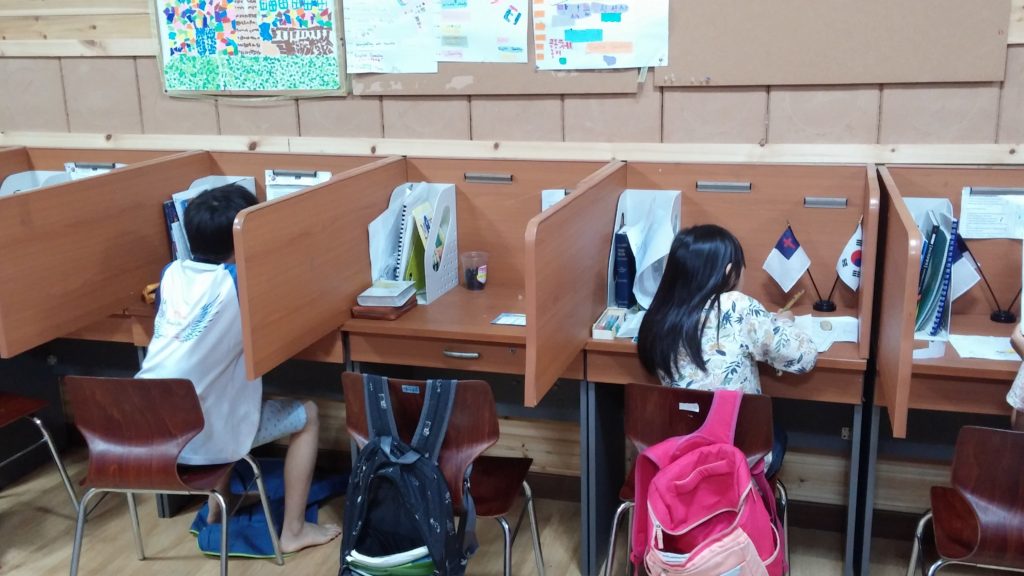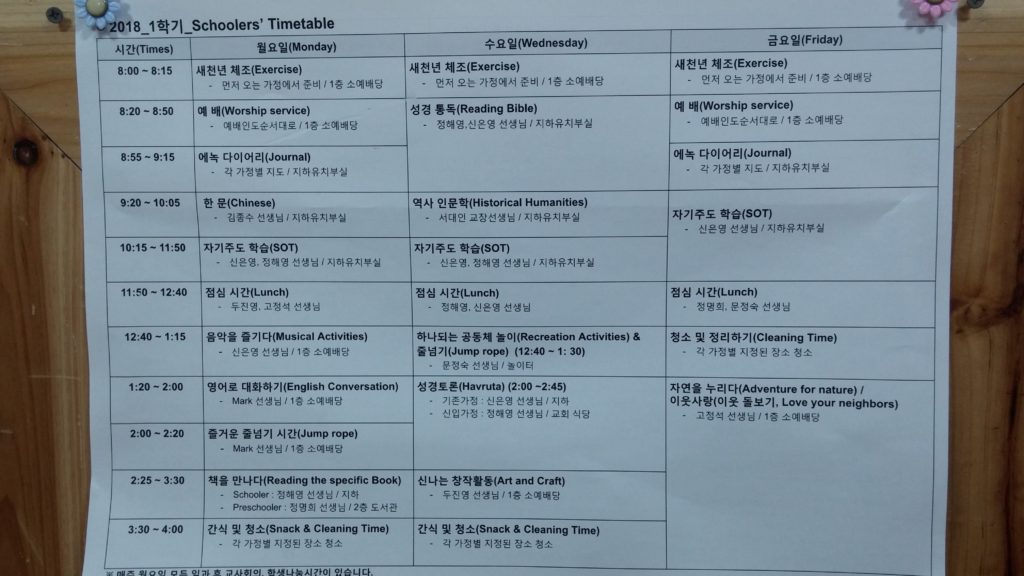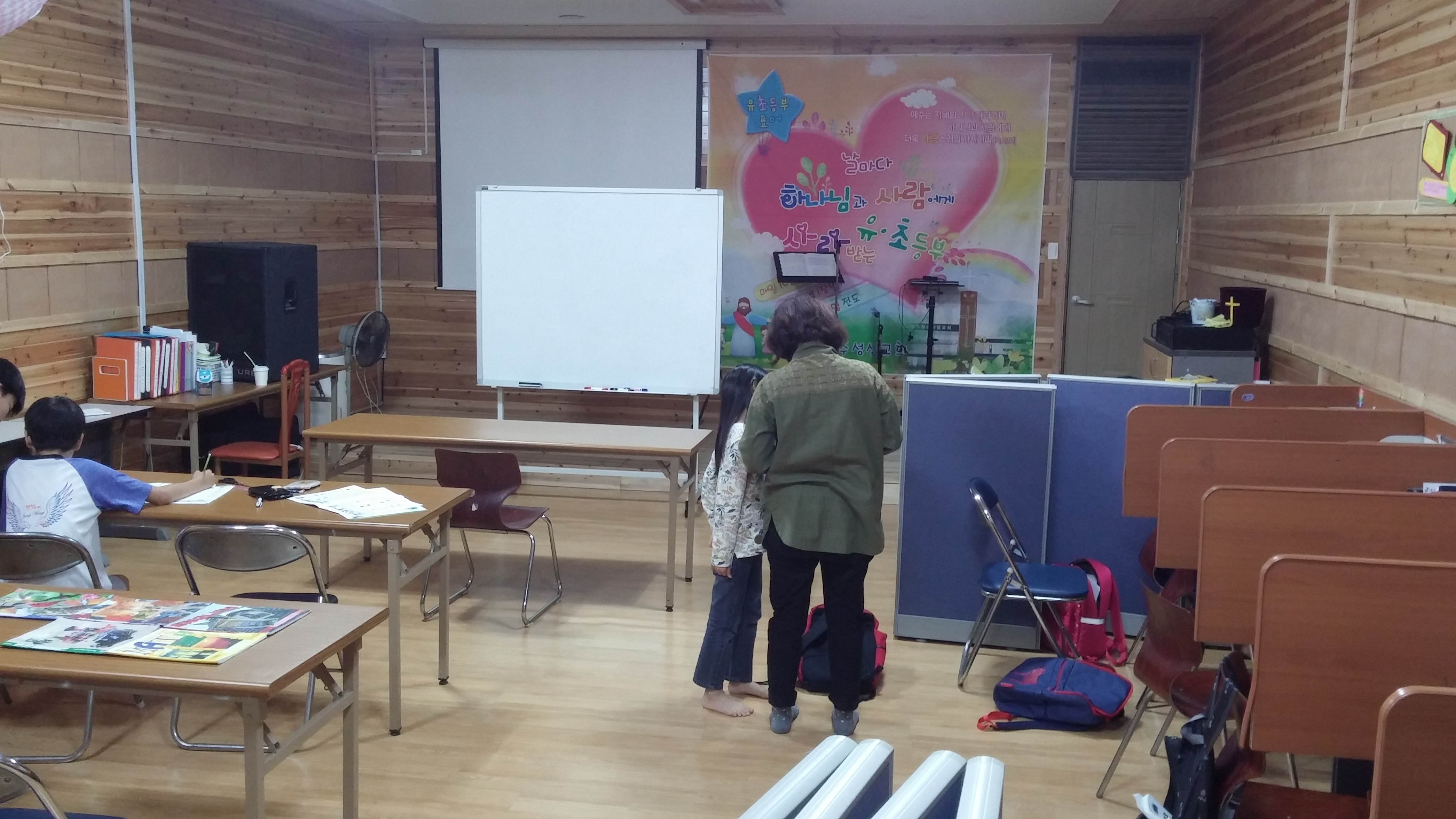Church-Home School in Usan-dong
Written by Robert Grotjohn
Photographs by Robert Grotjohn and courtesy of Sungsan Church Home School
Three years ago, Lee Song-yong and Jeong Hai-young, missionaries returning to South Korea after serving in Mongolia and Indonesia, were determined to educate their five children in a Christian, family-oriented way. First, they homeschooled their children, then they helped begin a church-home school.
Missionary Lee said that starting the school was like a miracle. He and his family were newcomers in Gwangju, but they had a dream to find a church sponsor. Prayer led them to Sungsan Church near Malbau Market, and they proposed a church-home school to Pastor Suh Dae-in. Pastor Suh said, “Alright, let’s try it,” even though he barely knew Missionary Lee. The school has been accepting students (“schoolers”) and their families for the last two and a half years. Now, schoolers range from first grade to high school age.

There are currently two international families in the group: one from South Africa, and one with a mother from Vietnam. Sungsan Church Home School is eager to welcome more international as well as Korean participants who may be searching for an affordable Christian alternative to public education. Because the parents do the teaching, the tuition is much lower than at other Christian schools. With the books, the cost is about 150,000 to 200,000 won per child per month.
The school has no denominational requirement, and is open to anyone who agrees to the Christian educational principles and curriculum. The group emphasizes that a Biblical perspective on education is not just about curriculum but also about who is going to teach. They follow the advice of Deuteronomy, Chapter 6, which instructs parents to teach their children. Thus, at least one parent must be a full-time participant in the school.
Participating full-time means that the parents and their children meet for schooling at the church from 8:30 a.m. to 3:30 p.m. on Mondays, Wednesdays, and Fridays. Tuesdays and Thursdays are pure homeschooling days.

Much of the curriculum is based on a set of homeschooling textbooks from the U.S. that are written in English. The schoolers study Korean language, culture, and history as well. The whole-family involvement means that parents are responsible for much of their own child’s education and also that they are free to bring in their own ideas and methods. One mother, for instance, brings her own Korean-language textbooks.
Most of the parents had no experience with homeschooling when they joined the project, but they are learning. They hope that someday experts in curriculum development might help develop a well-designed Korean-language homeschooling curriculum and textbooks.
Christian education is important to the group as a means of spiritual and character development. Missionary Lee emphasized the three principles of Spirit, Soul, and Body. The church-home school works to build the individual in Christian community. A motto on the church-home school website is “We grow when we help others grow.” The older schoolers act as big brothers and sisters to the younger schoolers and to the even younger children from the church-home pre-school and kindergarten.

Students work at their own pace and can emphasize their own interests. With the help of their parents and other teachers, the schoolers set up goals for themselves every morning. They meet in a basement classroom, and each schooler has his or her own “office” – an individual desk where work is done. Several schoolers worked at their offices when I visited, while others sat at small tables for individual help from one of the parent-teachers. There were three parent-teachers for nine children. That is a pretty good teacher-student ratio.
While this educational concept might seem novel in South Korea, Missionary Lee insists that home-based education is actually the most traditional method. At one time, young people were taught at home, and the church-home school concept holds that a return to such intimacy is good for students’ development.
I spoke with Mark Vermeulen, the participating parent of the South African family. He and his wife, Shannon, have had their three children in the church-home school for two years. Mark thinks the community emphasis is important. The children can work at their own pace, and there is no division between the international and the Korean students as there can be in public schools. The responsibility for others that is part of the Christian focus prepares students to be better members of society in the future, he believes. They will be able to help create a kinder and more loving world.
The church-home school movement is spreading, in part through a book by Missionary Lee, Your Spiritual Children Now (지금 키워라, 영적인 아이). The local group has helped start similar projects in Iksan, Daejeon, and Ulsan. On the day I visited, a group from Pyeongtaek was coming to observe because they are interested in starting their own church-home school. This movement offers a healthy alternative to public school education for those committed to Christian upbringing.
NEED MORE INFORMATION?
The organization has a Facebook page (look for “처치홈스쿨 사역원 Church-Home School Ministries”) and a website at churchhomeschool.org. The Facebook page gives contact information. Most of the web pages are in Korean, but the links to individual pages have English as well as Korean headings, and one can always get the gist of the message by using an e-translator. You can find the Monday-Wednesday-Friday schedule in both Korean and English through the “Sungsan Church-Home School” link from the drop-down menu for “Introduction.” Mark and Shannon Vermeulen, the international parents from South Africa, offer their testimonial in English on the “About Us” page. Missionary Lee speaks excellent English himself, so he can talk to anyone who is interested in the school but has limited Korean skills. He also has a slide presentation in English that he can share. His contact information is available on the “About Us” page.
The Author
Robert Grotjohn teaches American literature and popular culture in the Department of English Language and Literature at Chonnam National University and is a former editor-in-chief of the Gwangju News.




